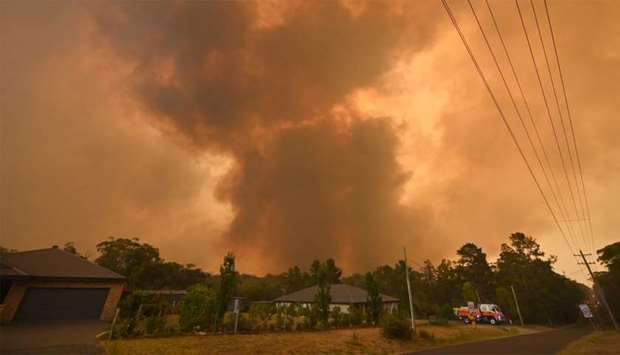Australian Prime Minister Scott Morrison apologised on Sunday for his decision to take an unannounced family holiday to Hawaii in the midst of a bushfire emergency and record-breaking heat.
Morrison came back on Saturday night, having decided to cut his trip short after widespread public criticism and the deaths of two firefighters who were killed battling a ‘horrendous’ blaze south-west of Sydney.
‘I have returned from leave and I know that [my holiday] has caused some great anxiety in Australia,’ Morrison said in a press conference Sunday morning, adding that with ‘the benefit of hindsight’ he would have acted differently.
‘I am sure Australians are fair-minded and understand that when you make a promise to your kids you try and keep it,’ Morrison said. ‘But as prime minister, you have other responsibilities, and I accept that and I accept the criticism.’ The prime minister's office was also heavily criticized for declining to confirm Morrison's whereabouts during the bushfire crisis, which triggered a second state of emergency in New South Wales (NSW) on Thursday.
The hashtags #WheresScotty and #Morrisonfires trended on Twitter in Australia this week, and a student protest was staged at Morrison's Sydney residence.
‘Thank you for doing nothing in Australia and holidaying in Hawaii,’ one of the young protesters said in Facebook Live video posted by rally organizers Schools Strike 4 Climate.
Upon his return, Morrison said that he can ‘accept the criticism.’ ‘For those Australians I caused upset to, I apologize for that,’ he said.
This week, Australia experienced its hottest days on record with the Bureau of Meteorology recording a national average temperature of 41.9 degrees Celsius on Wednesday and 41.0 degrees on Thursday.
At Sunday's press conference the conservative prime minister also addressed climate change, as the government faces pressure to take more action.
‘There is no argument about the links between... broader issues of global climate change and weather events around the world,’ Morrison said.
‘But I'm sure people equally would acknowledge that the direct connection to any single fire event - it's not a credible suggestion to make that link.’ The bushfire season started two months earlier than in previous years, with severe drought in most of eastern Australia for the last two years exacerbating conditions.
So far, more than 800 homes have been destroyed in NSW and the bushfires have reached the outskirts of the state capital Sydney, Australia's most populated city.
The harbour city has also been choking on air pollution due to bushfires smoke, with authorities saying out of 48 days since November 1, 28 days had ‘hazardous’ level of air quality.
Several thousand firefighters continue to battle dozens of out-of-control bushfires in four of Australia's states.

